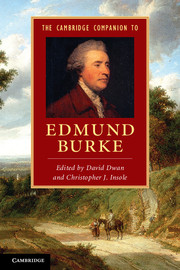Book contents
- Frontmatter
- Contents
- Contributors
- Acknowledgements
- Method of Citation
- Chronology
- Introduction Philosophy in Action
- 1 Burke’s Life
- 2 Burke, Enlightenment and Romanticism
- 3 Burke as Rhetorician and Orator
- 4 Burke’s Aesthetic Psychology
- 5 Burke on Law and Legal Theory
- 6 Burke on Political Economy
- 7 Burke and Religion
- 8 Burke and the Constitution
- 9 Burke and the Natural Law
- 10 Burke and Utility
- 11 Burke and the Ends of Empire
- 12 Burke and the American Crisis
- 13 Burke on India
- 14 Burke and Ireland
- 15 Reflections on the Revolution in France
- 16 Burke’s Counter-Revolutionary Writings
- 17 Burke in the United States
- Further Reading
- Index
- References
Introduction - Philosophy in Action
Published online by Cambridge University Press: 05 December 2012
- Frontmatter
- Contents
- Contributors
- Acknowledgements
- Method of Citation
- Chronology
- Introduction Philosophy in Action
- 1 Burke’s Life
- 2 Burke, Enlightenment and Romanticism
- 3 Burke as Rhetorician and Orator
- 4 Burke’s Aesthetic Psychology
- 5 Burke on Law and Legal Theory
- 6 Burke on Political Economy
- 7 Burke and Religion
- 8 Burke and the Constitution
- 9 Burke and the Natural Law
- 10 Burke and Utility
- 11 Burke and the Ends of Empire
- 12 Burke and the American Crisis
- 13 Burke on India
- 14 Burke and Ireland
- 15 Reflections on the Revolution in France
- 16 Burke’s Counter-Revolutionary Writings
- 17 Burke in the United States
- Further Reading
- Index
- References
Summary
Edmund Burke is one of the most important figures in the history of modern political thought, yet his thinking about politics is not easily reducible to a general or fully coherent philosophy. This is partly because of the practical character of much of his intellectual enterprise: elected to parliament in 1765, he remained – despite a brief hiatus in 1780 – a practicing politician for almost twenty-nine years. During this time, he never set out to produce a systematic work of political philosophy, and he repudiated attempts to read his various pronouncements on politics in this way. His account of his most famous work, Reflections on the Revolution in France (1790) – ‘I was throwing out reflexions upon a political event, and not reading a lecture upon theorism and principles of Government’ – arguably applies to the whole sweep of his political writings (C, VI: 304). His ‘works’ are largely a compilation of disconnected performances urging practical responses to specific problems from rebellion in America to revolution in France to political corruption in England to the abuse of power in Ireland and India. Whether or not one can abstract from these contexts a general doctrine or corpus of thought is debateable. And if such abstraction is possible, it is far from clear that his thought was consistent across contexts. He boasted later in life that if ‘he could venture to value himself on anything, it is on the virtue of consistency that he would value himself the most’, but his critics would continue to insist that this was a virtue in which he was most derelict (Works, III: 24).
Thus Burke’s writings are not swiftly convertible into a theoretical system and much of what he said might be regarded as explicitly hostile to any such endeavour. He was, after all, famously critical of abstract theory and called for a more modest and contextual approach to moral and political problems. ‘I cannot stand forward,’ he insisted, ‘and give praise or blame to any thing which relates to human actions, and human concerns, on a simple view of the object, as it stands stripped of every relation, in all the nakedness and solitude of metaphysical abstraction.’
- Type
- Chapter
- Information
- The Cambridge Companion to Edmund Burke , pp. 1 - 14Publisher: Cambridge University PressPrint publication year: 2012



